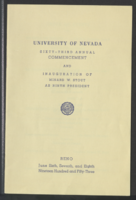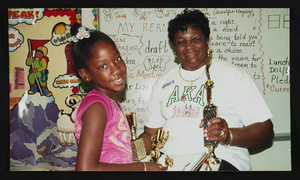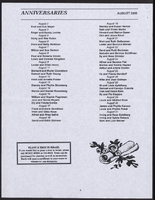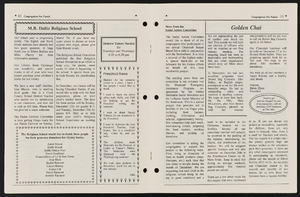Search the Special Collections and Archives Portal
Search Results

Transcript of interview with Lawrence Canarelli by Claytee White, May 1, 2016
Date
Archival Collection
Description
“At five years old, I was the youngest boy at the orphanage. This was the first time that I had lived with indoor plumbing and indoor showers.” To describe award-winning home builder Larry Canarelli as a self-made man is to grossly understate his accomplishments and his determination. Canarelli, founder of American West, Nevada’s largest privately owned development company, learned all about living without shelter as a very young boy. When he was nine years old, Canarelli, the second of his mother’s six children, encouraged his veteran stepfather to buy the family’s first permanent house for $80 down and an agreement to assume payments on the Veterans Administration loan. As his school peers dreamt of large, shiny cars, Canarelli envisaged big, beautiful houses. After self-funding his education, graduating from the University of California Los Angeles, completing two years of U.S. Army service, and earning his Master’s degree from University of Southern California, Canarelli began his career working with a large home building firm in the Los Angeles area. Three years later he switched firms, and the new company sent him to Las Vegas. In this interview, Canarelli reaches back to his childhood to explain his motivation to build houses: “All of my life, I had an interest in housing. Perhaps this is because of never having a house when I was younger.” He recalls how the Collins Brothers helped him when he founded American West. He describes the Southern Nevada “shelter market” of the 1970s and follows its evolution in style and marketing through the 1980s and 1990s; he talks about master planning and the builders who first master planned their Clark County developments: Pardee Homes in Spring Valley, American Nevada in Green Valley, and Howard Hughes Corporation in Summerlin. He speaks to the influences of interest rates and available land on housing prices; the importance of environmentally responsible housing; where the entry-level housing market will go, and ways that technology has changed home building and home buying. And throughout, he exemplifies his devotion to, knowledge of, and respect for Southern Nevada’s housing industry-its builders, its market, and its buyers.
Text

Transcript of interview with Herbert & Erma Holtam by Marc Hechter, February 7, 1976
Date
Archival Collection
Description
On February 7, 1976, collector, Marc Hechter interviewed Herbert and Erma Holtam in the collector’s home in Las Vegas, Nevada. This interview covers the history of the early Las Vegas Valley area. The discussion includes an in-depth overview of the Helldorado Parade and Helldorado Village. The building of the hotels on the Strip, homesteading, and local housing developments, are also discussed.
Text

University of Nevada (Reno) 63rd commencement program
Date
Archival Collection
Description
Commencement program from University of Nevada, Las Vegas Commencement Programs and Graduation Lists (UA-00115).
Text

Alpha Kappa Alpha Sorority, Theta Theta Omega Chapter ON TRACK program reports, photographs, and records
Date
Archival Collection
Description
From the Alpha Kappa Alpha Sorority, Incorporated, Theta Theta Omega Chapter Records (MS-01014) -- Chapter records file.
Text

Transcript of interview with Ann Lynch by Emily Powers, May 27, 2008
Date
Archival Collection
Description
Ann Lynch discusses her background - born in Kansas City, 1934; attended Baker University in Baldwin, Kansas; classes at Kansas University; a year in theater; director of PR at Evansville University. In 1959 she came to Las Vegas as director of the clubs at Nellis Air Force Base. Ann shares in depth on her parents and grandparents and on her family today, which includes a brother 14 years younger, her son, and a nephew. She describes Las Vegas in the early sixties, meeting her husband, and her duties as club manager at Nellis. She comments on becoming camp director for the Girl Scout program at Mount Charleston, which led to training scout leaders and board members. When Ann's son Edward went to kindergarten, she took on the PTA job of parliamentarian, then president of Ruth Fyfe ES PTA. She eventually became President of the Las Vegas Area Council, Nevada State PTA president, and finally national president of the PTA. The school named after her (Ann T. Lynch Elementary) has benefited from her other charity organizations. Because of her PTA involvement, Ann became very active in legislation in Washington, D.C., traveling to other countries to help activate parent involvement. She had also worked with Sunrise Hospital during this time and when she was relieved of some of her PTA duties, she helped found the Sunrise Hospital Children's Foundation and the Public Education Foundation. She details the many functions of both foundations. Ann comments on the lobbying she does in the Nevada legislature and in Washington, D.C., medical billing through Medicare and Medicaid, and the ongoing shortage of nurses nationwide. She offers opinions on unions for nurses and mentions robotic surgery, the stroke center, neonatal center, and breast cancer center as evidence of recent developments in medicine at Sunrise Hospital.
Text

Interview with Oliver Wilhelm Kaufmann, November 29, 2005
Date
Archival Collection
Description
Text

Transcript of interview with Mary & Bruce Eaton by Beatrice Scheild, March 8, 1975
Date
Archival Collection
Description
On March 8, 1975, Beatrice Scheid interviewed Mary and Bruce Eaton about their lives in Boulder City, Nevada. Mary first talks about her life in the early days of Boulder City, specifically the influences of the churches and schools. She also talks about housing, transportation, and her career as an educator. Bruce (born 1904 in Toronto, Kansas) also talks about his life in Boulder City and his arrival to Southern Nevada as he sought employment in working on the building of Hoover Dam. Bruce talks about his employment with Six Companies, Inc. and discusses topics such as the employment wages, his and Mary’s experiences in building a house, and their experiences in buying a house built by Six Companies. Bruce also talks about the roles of Sims Ely, the city manager of Boulder City, and Frank Crowe, the construction superintendent of Six Companies. Bruce then discusses the issues of worker’s compensation as it related to work on the dam, and he describes, in detail, the cooling system us
Text



